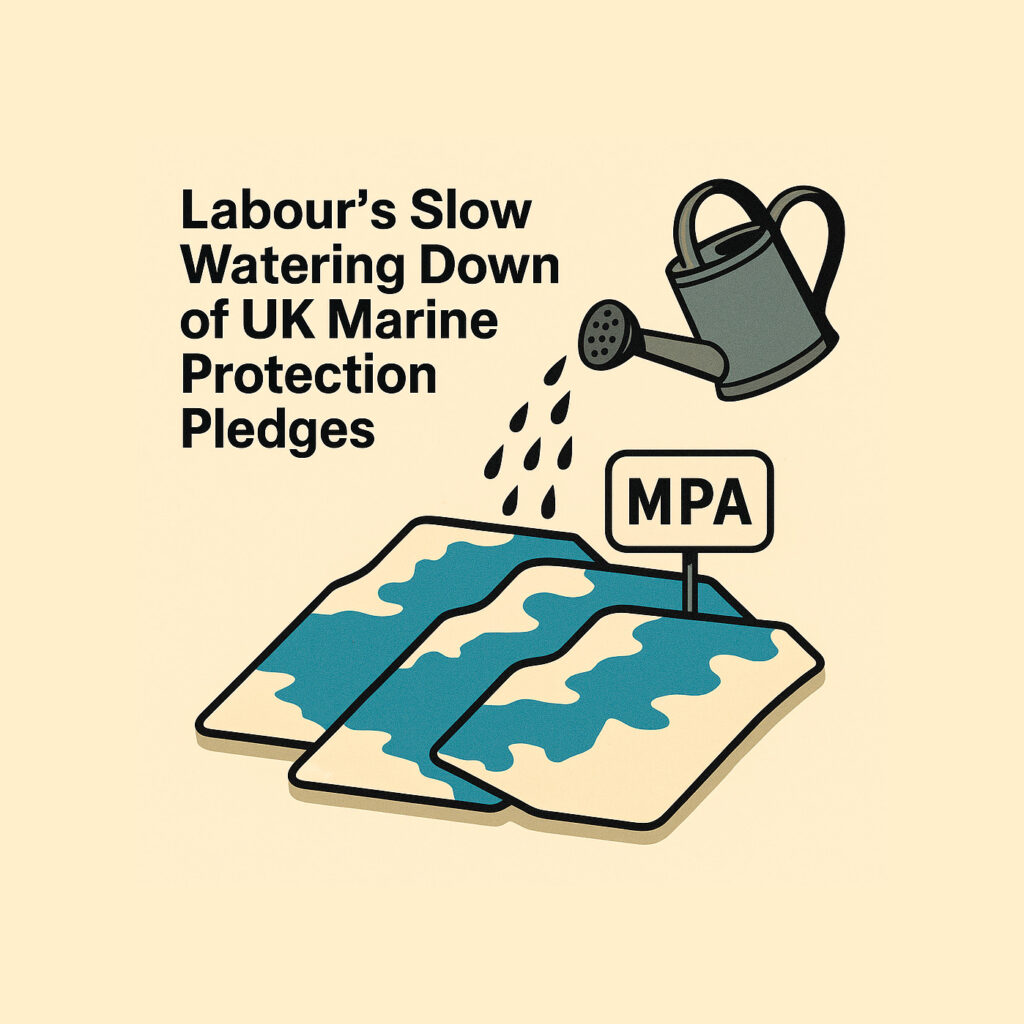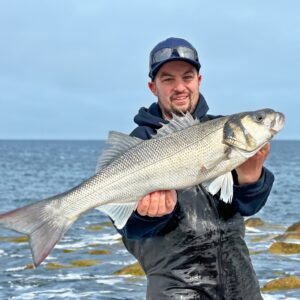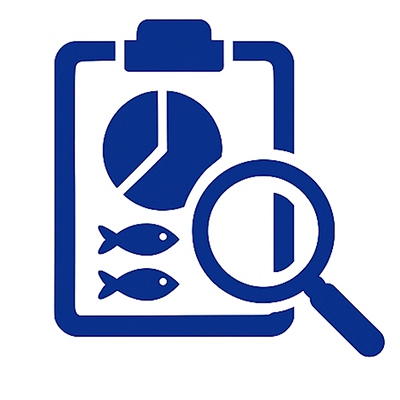Bold Promises on Bottom Trawling Ban (Election Campaign)
In the last general election campaign, Labour made sweeping promises to protect UK waters. The party pledged to “enact a ban on bottom-trawling in UK waters” if elected1. Labour’s Shadow Environment Minister at the time, Toby Perkins, emphasised that they would “stop destructive bottom trawling that is destroying our ocean ecosystem,” calling it “one of our first measures” in government2. This went beyond just Marine Protected Areas (MPAs), it implied an outright ban across all UK waters. Such bold rhetoric gave environmentalists and coastal communities hope that a Labour government would take uncompromising action to end a fishing practice widely seen as highly destructive.
Labour candidates also signalled they would stand firm on protecting Britain’s fishing industry in any post-Brexit EU negotiations. For instance, Daniel Zeichner (then shadow fisheries minister) wrote that a Labour government would “back our British fishing industry” for a “fairer share of the quota in our waters”, ensuring foreign boats play by the same rules3. The clear message during the campaign was that British fisheries would not be bargained away. All this set an expectation that Labour would not repeat past “sell-outs” of fishing rights and would prioritise sustainable domestic management of UK waters.
Post-Election Reality: EU Deal Extends Foreign Fishing Access
Once in power, however, Labour’s resolve was quickly tested in negotiations with the EU. In May 2025, Prime Minister Keir Starmer struck a major “reset” deal with Brussels – and as part of it, the UK granted European vessels continued access to British fishing waters for 12 more years4. (Originally, EU fleets’ post-Brexit access was to be renegotiated in 2026.) Observers noted that EU negotiators initially sought a 10-year extension while the UK offered 4, and they “settled on 12” years5, a significant concession.
Starmer defended the deal, insisting it was “good for fishing” and brought stability6 7. He stressed that “none of the rights negotiated by the Conservatives had been removed”, no change in quotas or increased EU catch limits, only the timeline was extended8. In a Commons debate, he argued, “There is no reduction in the British quota or increase in the EU quota; they are the same as before… We have reciprocal arrangements, which are the same as before”9. In Starmer’s view, allowing longer-term access was worth it to eliminate yearly uncertainty, and he highlighted new trade perks like reduced red tape for seafood exports as a trade-off10
Nonetheless, fishing communities felt betrayed. Critics lambasted the 12-year fishing rights extension as “a stitch-up” and “a betrayal of British coastal communities”, accusing the government of surrendering leverage for minimal gain11. Even some who supported sustainable fisheries worried that Labour had negotiated away a key chance to reclaim control in 2026. The contrast was stark: during the campaign Labour swore not to sell out fishermen, yet in practice they locked in the status quo until 2038. Starmer’s “stable” deal essentially delayed any opportunity to increase the UK’s share of fish or to impose new conditions on EU boats for over a decade. This set the stage for growing skepticism about the government’s commitment to bold change in marine policy.
From “Ban in All Waters” to Only Some MPAs
Facing criticism over the fisheries deal, Labour moved to shore up its green credentials with a long-awaited pledge on bottom trawling. Environment Secretary Steve Reed announced plans to ban bottom-trawl fishing, but notably, not in all UK waters as originally promised, only within marine protected areas. In early June 2025, Reed unveiled a proposal to prohibit bottom trawling in 41 MPAs covering 30,000 km² of England’s seas12. This would amount to roughly half of England’s protected waters by area, bringing the total coverage of trawl-free zones to about 48,000 km² when adding existing bans13. Reed framed it as the government taking “decisive action” to protect marine habitats: “Bottom trawling is damaging our precious marine wildlife and habitats… Without such action, our oceans would be irreversibly destroyed.”14
However, this policy was already a significant dilution of Labour’s campaign pledge. Instead of banning the practice across all UK waters, the plan targeted only select conservation areas. Even within the MPA network it was incomplete, focused on certain offshore sites. The government’s own press release tellingly added that bottom trawling would be banned “where appropriate”15. In other words, the ban would not automatically cover every protected area, only those deemed “vulnerable” enough. Environmental groups welcomed the step as “overdue” but also noted its limited scope. The Wildlife Trusts, for example, applauded the consultation to ban trawling in “over 40 offshore sites” and called it a great step – yet implicitly pointed out that damaging fishing had long been “allowed to continue within many of our MPAs” until now16. In fact, as of early 2025, only 8% of UK waters (and a fraction of MPAs) had any trawling restrictions, so this proposal, while positive, was far from the blanket ban once promised.
“All MPAs” Shrinks to “Offshore MPAs”
Initially, there was an expectation that all Marine Protected Areas might finally be closed to trawling. Just weeks earlier, Labour MPs had been pressing the government to use the UN ocean summit to announce a “ban on all bottom trawling in marine protected areas”17. But the actual announcement in June targeted only offshore MPAs under English jurisdiction. The shift in language was apparent. The Chair of the Environmental Audit Committee (EAC), Labour MP Toby Perkins, noted he was “delighted” the government was acting on his committee’s recommendation to ban trawling in offshore MPAs18. The EAC’s report had urged a halt to seabed-damaging gear in those offshore sites, even where the MPA’s official features were not seabed-related19. By embracing the committee’s advice, ministers essentially narrowed the pledge to just offshore protected areas, implicitly excluding many inshore coastal MPAs and any sites in Scotland, Wales or Northern Ireland’s waters not under DEFRA’s direct control.
This progression, “all UK waters” to “all MPAs” to just “offshore MPAs” and then “just 41 of them” did not go unnoticed. Conservationists cautioned that protecting only some sites would leave many sensitive habitats still exposed. Scientists pointed out that partial protections (e.g. banning trawling only on specific reef features inside an MPA) are insufficient for full ecosystem recovery20. In their open letter to ministers, a group of marine scientists stressed that nothing short of banning bottom-towed gear across the entire MPA network would meet the UK’s own 30×30 ocean protection goals21. By limiting action to certain MPAs, Labour opened itself to the charge that it was opting for “impressive sounding targets” over truly comprehensive protection, the very critique one NGO official levelled at past governments’ marine policy22.
Consultation and Further Dilution Fears
The government launched a 12-week consultation on the MPA trawling bans, inviting industry and public feedback on each of the 41 proposed sites23. This in itself raised eyebrows among campaigners. The consultation structure, effectively treating each MPA individually, suggests that the final policy could be watered down even further. There is a real possibility that after “consulting,” ministers might scale back or drop restrictions in some of those 41 MPAs, especially where fishing lobby pressure is high.
Indeed, recent remarks from Fisheries Minister Daniel Zeichner hinted at exactly that. Speaking at the Shellfish Association of Great Britain’s annual conference, Zeichner cautioned that media coverage of the MPA ban plan had been oversimplified. He was quoted in Fishing News as saying he had “seen the headlines” and that “the reporting is not precise… why make changes in MPAs that aren’t at risk? There is a way through this.” In other words, the minister suggested that if an MPA isn’t deemed “at risk” from trawling, it might not see new restrictions after all. This signals yet another potential climb-down: even some of those 41 sites could be spared the ban if officials decide they’re low-risk or if compromises can be made. Such language “where it presents the most risk” echoes the EAC report’s careful wording and seems to prepare the ground for exemptions or a case-by-case approach rather than the blanket ban conservationists expected24.
For campaigners, this is troubling. The consultation’s fine print and ministerial commentary are eroding the clarity of the original promise. What started as a bold pledge to ban destructive trawling everywhere in UK waters may end up as a limited set of measures in a subset of protected areas and perhaps not even all of those, once the fishing industry’s input is weighed. The pattern of retreat is undeniable. As one ocean policy expert observed, “Conservation policy is awash with shiny new announcements and impressive sounding targets whereas what is needed is actual delivery”25. Each successive announcement by the government has shrunk in ambition, from all waters, to all MPAs, to offshore MPAs, to just 41 offshore MPAs and now possibly to only a portion of those sites after “further study.”
Conclusion: Time for Action, Not Optics
The trajectory of this policy raises the question: by the time the consultation concludes and the government actually implements these measures, what will remain of the original vision? Will we see a genuinely transformative ban on industrial fishing gear in a broad swath of UK waters or just a handful of token sites with little active fishing to begin with? Critics fear the latter. The phrase “paper parks” has often been used to describe MPAs that exist only on maps. If the current proposals are whittled down further, there is a real risk the government’s much-touted trawling bans could become paper parks 2.0, conservation measures largely on paper, with minimal real-world impact.
This is a pivotal moment. The Labour government won a mandate on promises of environmental leadership and not “negotiating away” Britain’s natural assets. Now is the time for action, not optics. Instead of incremental, negotiated rollbacks to appease every stakeholder, ministers must remember the spirit of what was promised to voters and demanded by science. Bottom trawling has been likened to “bulldozing the seabed”, its impacts are indiscriminate and severe. If we truly want to protect and restore our marine ecosystems, half-measures won’t cut it. As Steve Reed rightly said, “without urgent action, our oceans will be irreversibly destroyed”26.
Urgent action means seeing the commitment through in full. It means enacting bans that might be unpopular with some fishing interests in the short term but are necessary for the long-term health of our seas. The watering-down of MPA protections must stop. Otherwise, by the end of this process we may be left with only a symbolic gesture, politically convenient but ecologically insignificant. The oceans do not need more political compromises; they need genuine protection. The question remains whether the government will deliver substance over spin. Will Labour’s legacy be a turning point for marine conservation – or yet another missed opportunity dressed up in green PR? The coming months will provide the answer, and ocean advocates will be watching closely.
Sources:
15 gov.uk
16 gov.uk
23 gov.uk
26 gov.uk







